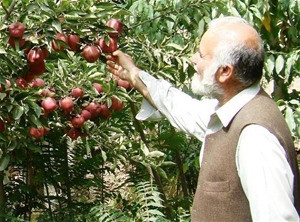
A farmer in Wardak inspects his apple crop. In early November 2009, USAID helped farmers in Wardak and Paktya export their apples to India for the first time.
USAID/ASAP
USAID helped open India’s booming market to Afghan apple farmers.
12 NOVEMBER 2009 | WARDAK PROVINCE, AFGHANISTAN
In early November 2009, Afghan farmers made history with the first-ever export of their apples to India. The country’s farmers now have the opportunity to introduce their apples – some of the crunchiest, sweetest, and largest in the region – to the biggest market in South and Central Asia. USAID worked with a local trader to facilitate a trial shipment of three metric tons of apples to India. The apples are now shipped on Air India through special rates that USAID negotiated with the airline. Up to 75 metric tons of apples will be exported each week from apple-growing regions like Wardak and Paktya provinces until the end of December.
India requires a pest risk analysis for apple imports to prevent infestations by dangerous pests. In partnership with Afghanistan’s Ministry of Agriculture, Irrigation and Livestock, USAID completed the analysis, which details methods to prevent infestations, and submitted the document to India’s Ministry of Agriculture. India can require up to a year to process the document, but USAID expedited approval through visits with officials in New Delhi.
“I’m really happy about this,” said Gul Amin Khan, an apple farmer from Wardak. “We can now sell our apples, which are famous for their sweetness, at a good price to India.”
The opening of the Indian market comes just as Afghan farmers, like Khan, harvest their apples. USAID, in partnership with Coalition Forces, provided the farmers with training to improve the quality and quantity of the apples and to introduce proper sorting, grading, and packaging procedures. As a result of the partnership, farmers are also using cold storage facilities that allow them to wait for optimal prices before selling the fruit.
A drought has reduced India’s apple harvest, and Afghanistan will fill a surging demand. Afghan farmers will likely receive far higher prices in India as compared to Pakistan and the local market. “I’m expecting to sell our apples at a good price in India,” said Abdul Masood, a farmer who received training from USAID. “That, in turn, will encourage us to grow more apples, export them to India, and get more money, which can contribute to the local economy.”







Comment
Make a general inquiry or suggest an improvement.